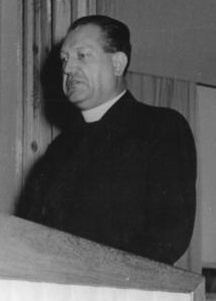
Czechoslovak Catholic priest and politician, deputy in the Czechoslovak parliament and minister of health from 1948 until 1968, Vice-President and later President of Czechoslovak People’s Party, representative of the party’s collaboration with the dictatorship of the Communist Party of Czechoslovakia.
2 March 1902, České Budějovice – 5 November 1981, Prague
Josef Plojhar came from a Czecho-German family, but identified as Czech. He studied at German state grammar school and joined the seminary. He was ordained in 1925. Before the Second World War, he was a chaplain in České Budějovice and a member of Czechoslovak People’s Party. During the war, he was a prisoner of a concentration camp and after the war’s end he advocated leftist views and collaboration with the Communist Party of Czechoslovakia within the framework of the National Front.
In February 1948, Plojhar accepted the post of minister of health in Klement Gottwald’s reconstructed government and contributed to Czechoslovak People’s Party’s becoming a subordinate political party that legitimized the dictatorship of the Communist Party of Czechoslovakia. He played the role even at a time when the Catholic Church and the original leadership of Czechoslovak People’s Party faced reprisals. In 1975, he was one of the submitters of a law that allowed abortions. He remained minister of health until 1968. Apart from that, he was a member of parliament and of the Central Action Committee of the National Front, initiator of a number of actions by Catholic priests closely collaborating with the regime, e.g. Catholic Actions. He was President of the Peace Movement of Catholic Clergy and the Nation-Wide Council of Catholic Clergy, and between 1952 and 1970 he was Vice-President of the Union of Czechoslovak-Soviet Friendship. Although in 1968 he was dismissed from the presidency of the Czechoslovak People’s Party, during the period of Normalisation he became an honorary president of the party and was repeatedly elected deputy in the Federal Assembly until his death.
Because of his active pro-regime views and loyalty to the Communist Party of Czechoslovakia, Plojhar was suspended in 1948 by Cardinal Beran, Archbishop of Prague, and later excommunicated. In spite of the strong pressure from the state, Beran never lifted the excommunication, which Plojhar never recognised. Plojhar was not recognised and respected by regular members of Czechoslovak People’s Party. He became a symbol of a Catholic collaborating with the regime, who oppressed the Catholic Church and who, moreover, had a reputation of a priest with a soft spot for women and alcohol. He was recognised and acclaimed by the ruling totalitarian regime. He was decorated with the Order of Klement Gottwald in 1955 and 1962. He was the longest-serving Czechoslovak minister of health (although in reality, his assistants made decisions about professional matters of the ministry). In May 1969, after the death of Cardinal Beran in exile in Rome, Plojhar did his best to make the Czechoslovak state authorities refuse the transport of Beran’s remains from Rome to Prague. Because of this, Beran’s remains were returned to Prague as late as April 2018. J. Plojhar is an example of a person closely collaborating with the dictatorship of the Communist Party. In Czechoslovak People’s Party, he was one of the functionaries that turned the party into a mere satellite organisation of the Communist Party of Czechoslovakia.
2016-2020 ABCzech.cz - © Filozofická fakulta Univerzity Karlovy
Content from this website may be used without permission only for personal and non-commercial purposes and with the source cited. Any other use is allowed only with the authors' consent.
This web application Sonic.cgi meets GDPR requirements. Current information can be found here.